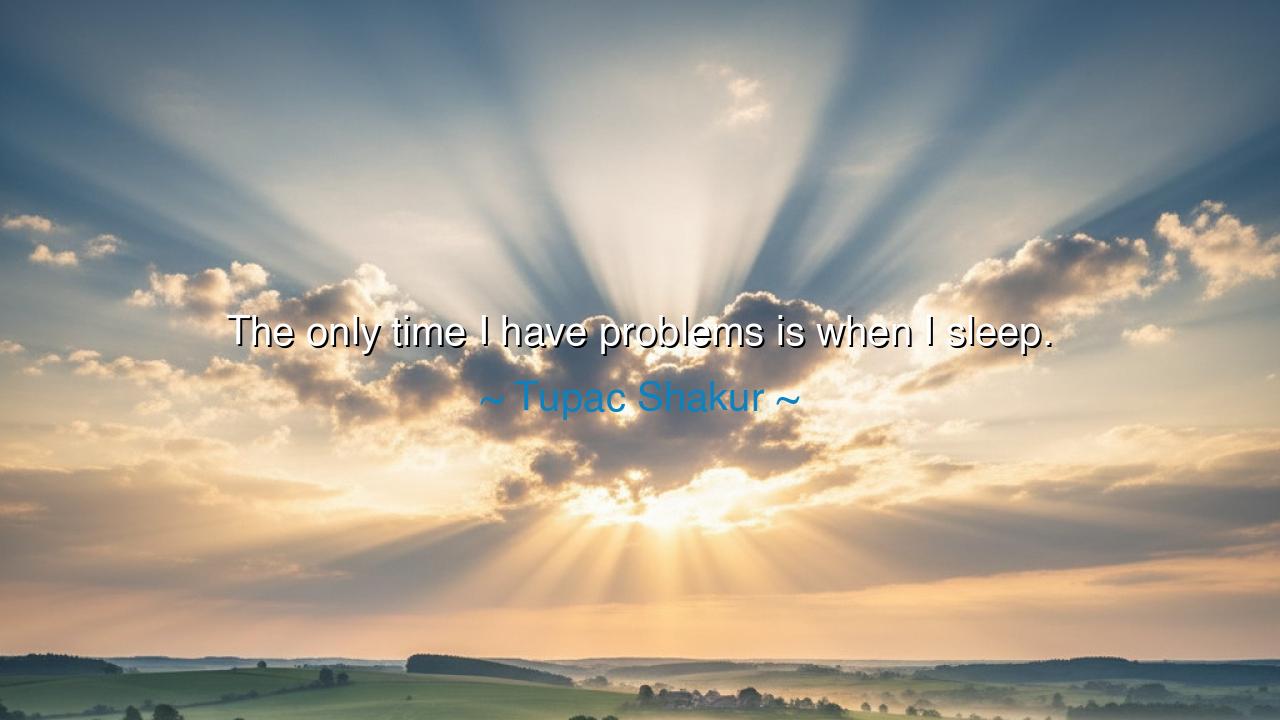
The only time I have problems is when I sleep.






The words of Tupac Shakur, “The only time I have problems is when I sleep,” carry the sound of a soul burdened by visions and memories that do not rest, even in the stillness of night. To the unthinking ear, these words may seem light or casual, but to those who listen deeply, they reveal the torment of a man whose battles did not end when his eyes closed. For the day brought him struggle and conflict enough, but it was in dreams, in the silence of sleep, that the weight of unhealed wounds and haunting visions pressed most heavily upon him.
This quote speaks of the truth that rest does not always bring peace. For some, the night becomes a battleground of the mind, where regrets, fears, and unspoken griefs rise like specters to demand attention. To the restless spirit, sleep is not a sanctuary but a mirror, reflecting all that cannot be forgotten. In Tupac’s words we hear the cry of a warrior who finds strength in the waking hours to fight, to create, to speak—but who, in the vulnerability of sleep, cannot defend himself from the storms within.
The origin of such a statement is deeply tied to Tupac’s life—a life lived in turbulence, surrounded by violence, poverty, political struggle, and the constant threat of death. Though he projected strength, fire, and resilience by day, by night he was left alone with his thoughts. His dreams were not gentle; they carried the weight of his past, the shadows of his enemies, and the fears of his future. In this, his confession is not weakness, but honesty—the honesty of one who knows that the fiercest battles are fought within.
History offers us parallels to this truth. Consider the story of Alexander the Great, who conquered empires yet was said to be plagued by nightmares and restless nights. Though he ruled lands and armies, his inner world was never quiet, and his sleep became a place of unrest. So too with soldiers returning from war, or leaders burdened by the cost of their choices—they often find that the waking world is easier to endure than the haunting silence of dreams. In this, Tupac joins a long line of souls who discovered that the night can be more merciless than the day.
The deeper wisdom here is that pain unhealed will always find its way to the surface. We may outrun it in the daylight with action, with work, with noise—but in sleep, when the mind is unguarded, it returns to demand attention. Thus, Tupac’s words teach us not only about his personal struggle, but about the universal truth of the human condition: that true peace is not found merely in rest, but in reconciliation with one’s inner self.
To the seeker of wisdom, the lesson is clear: do not wait until sleep to face your demons. Confront them while you are awake, with courage, with honesty, with healing practices that restore the soul. Speak your grief, write your pain, seek counsel, embrace forgiveness—do not bury what will only rise again in the night. By doing so, you turn the battleground of sleep into the sanctuary it was meant to be.
The practical action is this: each day, make time to unburden your spirit. Reflect on what troubles you, release what chains you, and tend to the wounds of the heart. If your nights are restless, seek the causes in your waking life. Do not ignore the voice of your dreams, for they reveal what must be healed. In this way, you will not merely collapse into sleep, but enter it as one who walks into a temple, at peace with himself and his world.
Thus, let Tupac’s words endure as both confession and teaching. The warrior may fight bravely by day, but unless he tends to his soul, his battles will follow him into the night. Let us therefore live so that even our sleep may be peaceful, and our dreams not chains of torment but wings of freedom. For the true victory is not only to survive the day, but to rest at night without fear.






AAdministratorAdministrator
Welcome, honored guests. Please leave a comment, we will respond soon